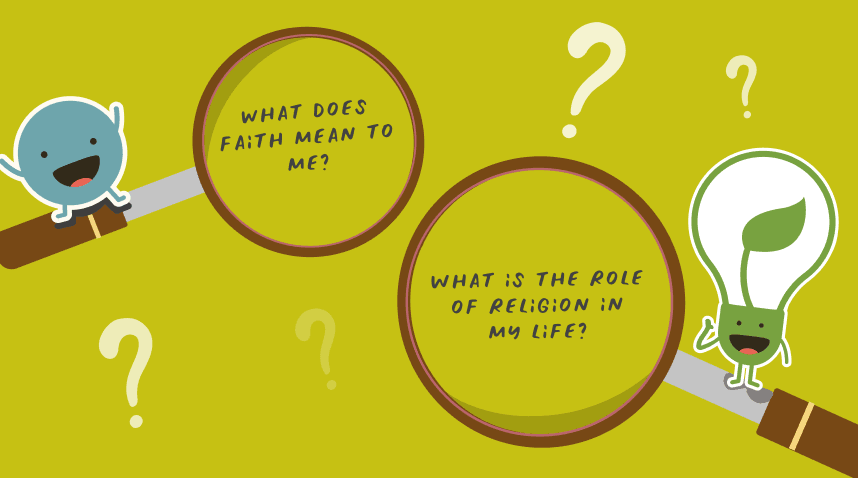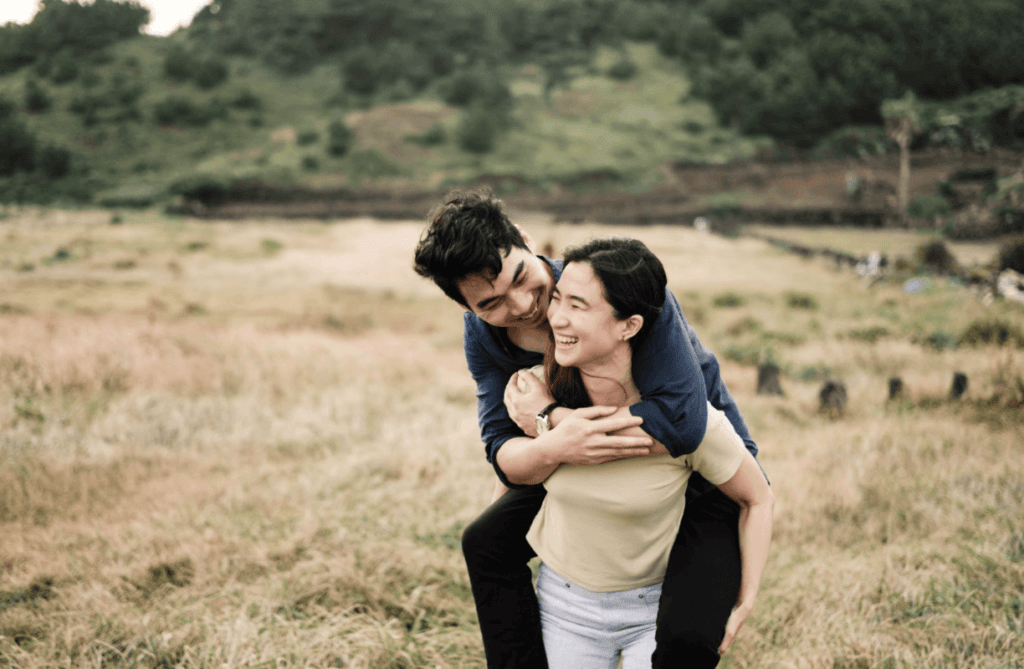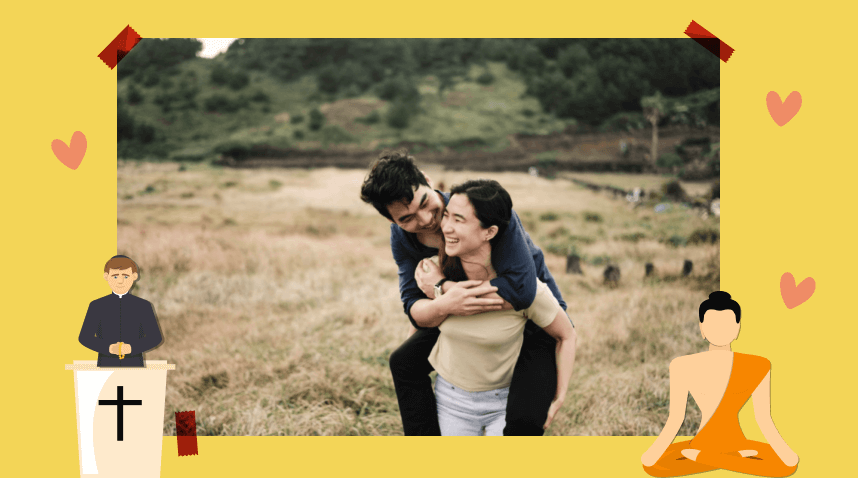TLDR: Nico shares her tips for a harmonious interfaith relationship. This includes having space for self, partner, and community acceptance.
“Huh? He goes to church every Sunday then you are not Christian how? Can make it work not? Are you going to convert? Can get married not? Next time kids how?” I’ve received multiple variations of these questions from concerned relatives and friends over the years.
Depending on how much time they have, I’d either smile, nod, and shrug nonchalantly, or go into a deeper explanation of our plans for compromise.
I recently got engaged to my fiance and we’ve been together for close to 9 years (and counting!). He identifies as a strong Christ believer and I am a spiritual-based Buddhist. Those external prompts are no surprise to me as I myself have ruminated over these thoughts one too many times over the many years.
Till today I admittedly don’t have all the answers. I try to welcome well-intentioned advice and try to stay clear of those that cast doubt and fear.
But beyond that, what I’ve also noticed and learnt over time is that couples could break up due to reasons beyond religion or stay together even with different ones. I’ve learnt to focus instead not on bridging these differences (there are and will be endless ones in the course of one’s life), but on finding uppekha (equanimity) and acceptance in the divide.
It’s not a catch-all but these are some musings I have regarding acceptance on three levels to build a lasting interfaith relationship: individual, partner, and community.
1. Individual

I find myself needing to reflect within myself and ask introspective questions like “What is the role of religion in my life? What does faith and spirituality mean to me? Is it a code of morality I adhere strictly to or do I lean into the community and network that religious institutions provide? Is it something I want to practise quietly and journal about, or be an active member of a group and apportion a greater amount of time to serve?”
To be honest, I still oscillate within this spectrum but broadly speaking, coming to terms with what role religion plays in my life is crucial for knowing how I should carry myself, what fundamental beliefs I hold close to, and where I should draw the line in the sand during disagreements.
I am thankful Buddhism is an all-encompassing inclusive religion that I draw on for strength and allows me to learn to be more compassionate and invest in developing wisdom for personal growth.
My individual acceptance of what religion means to me allows me to be freed of the ‘ego’ in the ‘Buddhism’ label, and detach from the fear of ‘losing myself’ if I am ‘forced’ to ‘convert’.
To me, religion is as straightforward as trying to live a life of love and compassion, and if it brings about peace and harmony, then why attach strongly to certain labels that are important to some but not to you?
2. Partner

When both parties are self-assured in first understanding the role that religion plays in their own individual lives, this then allows us to come together to find areas where we have common ground and can mutually compromise on.
It takes two to tango but two left feet to trip and fall. And in the dance of life, it’s important to be in lockstep through the various rhythms and music changes.
I find asking these questions useful in helping me meander through our ebbs and flows: “What role does religion play in my partner’s life? Is it a huge part of his community and identity? Are shared beliefs crucial for him in his practice or is he open-minded about us practising separately? Am I willing to let go of preconceived notions of my partner’s religion and truly understand how they practise through their own unique lens?”
I’ve learnt the marked difference between superficial acceptance out of necessity and active acceptance out of wisdom.
Beyond just passively recognising the difference, practising the “we can agree to disagree” thought, and sweeping tough conversations under the rug, can I go the extra mile and build a more nurturing relationship by showing interest in learning more about his beliefs? It might not be intuitive but can our varied religious beliefs and practices be instead a binding tool for us?
By practising “ehipassiko” (loosely translated as “come and see for yourself”.), I feel encouraged by my religion to seek and explore knowledge gaps, to be curious about his background and way of thinking, and try to carve a role that I can play whenever he faces difficulties and taps on his religion for courage and guidance.
Instead of merely giving him space to pray in times of adversity, can I cultivate myself to be an additional pillar of support for him using his way of coping? If I am equipped with some knowledge of their religion, I can better help be their second line of defence.
For example, am I able to help cross-reference some of the biblical quotes to soothe and comfort him? Or maybe in a tongue-in-cheek way, mention that “if God doesn’t answer your prayers, try meditating and wait until he does?” 😉
3. Community

Falling in love is easy, effortless, and ephemeral. Committing to a long-term relationship, on the other hand, requires a different mindset—it’s not merely about the spark, the butterflies, and the initial gooey-eyed red-roses lens anymore.
It’s about unsexy practical things like aligning financial goals, assimilating each other into respective communities of parents/friends/coworkers, and managing projects on building the best nest for yourselves (e.g. house, renovations, weddings, kids, etc. And in generally high-cost country like Singapore, I am sure all these milestones cause undue stress.)
Even if both parties have a mutual agreement on our different faiths, what about the family we came from or the one we want to build? Will our parents accept that neither of us will be going to family service/retreats together? Will our offspring be torn between two seemingly conflicting sets of beliefs? How should we navigate the practical constraints around this?
I know of situations where couples break up because their partner’s families are unsupportive or have created an environment where it becomes unhealthy for the relationship to progress any further.
They absolutely can’t be faulted—for some people, religion is closely intertwined with the way they were brought up.
I know my parents value their religious practices—they go for yearly meditation retreats (bhavana), volunteer their time and resources at local Buddhist centres (dana), and strive to lead a life guided by the triple gems (sila). My dad even once shaved his head and stayed in a monastery under Ajahn Brahm in Perth.
My partner’s family is equally diligent about their faith—they show up weekly at church together, say grace before meals, and share daily biblical verses in their family Whatsapp group. His family also grew up religiously and adopted similar family rites.
It is very apparent that religion to both sides is inextricably linked with familial bonds. If we impose our beliefs on each other, we risk breaking the entire fabric of these decades of precious ties and shared memories.

That leads us back to the first two levels aforementioned as well—what does religion mean to your partner? Is it more than just his individual beliefs, but something he wants to be replicated in the other areas of his life too? A healthy interfaith relationship takes acceptance from yourself as an individual, your partner, and also your wider community.
“So how, can work not?” to that I answer, “See whether I accept, he accepts, they accept lor.” And thankfully, these levels have been conquered and worked out well so far, such that hopefully I continue to live to tell the tale.
Wise Steps:
- Contemplate: What is the role of religion in my life? What does faith and spirituality mean to me?
- Understand: What role does religion play in my partner’s life? Is it a huge part of his community and identity?
- Learn: What does religion mean for my partner’s family?


